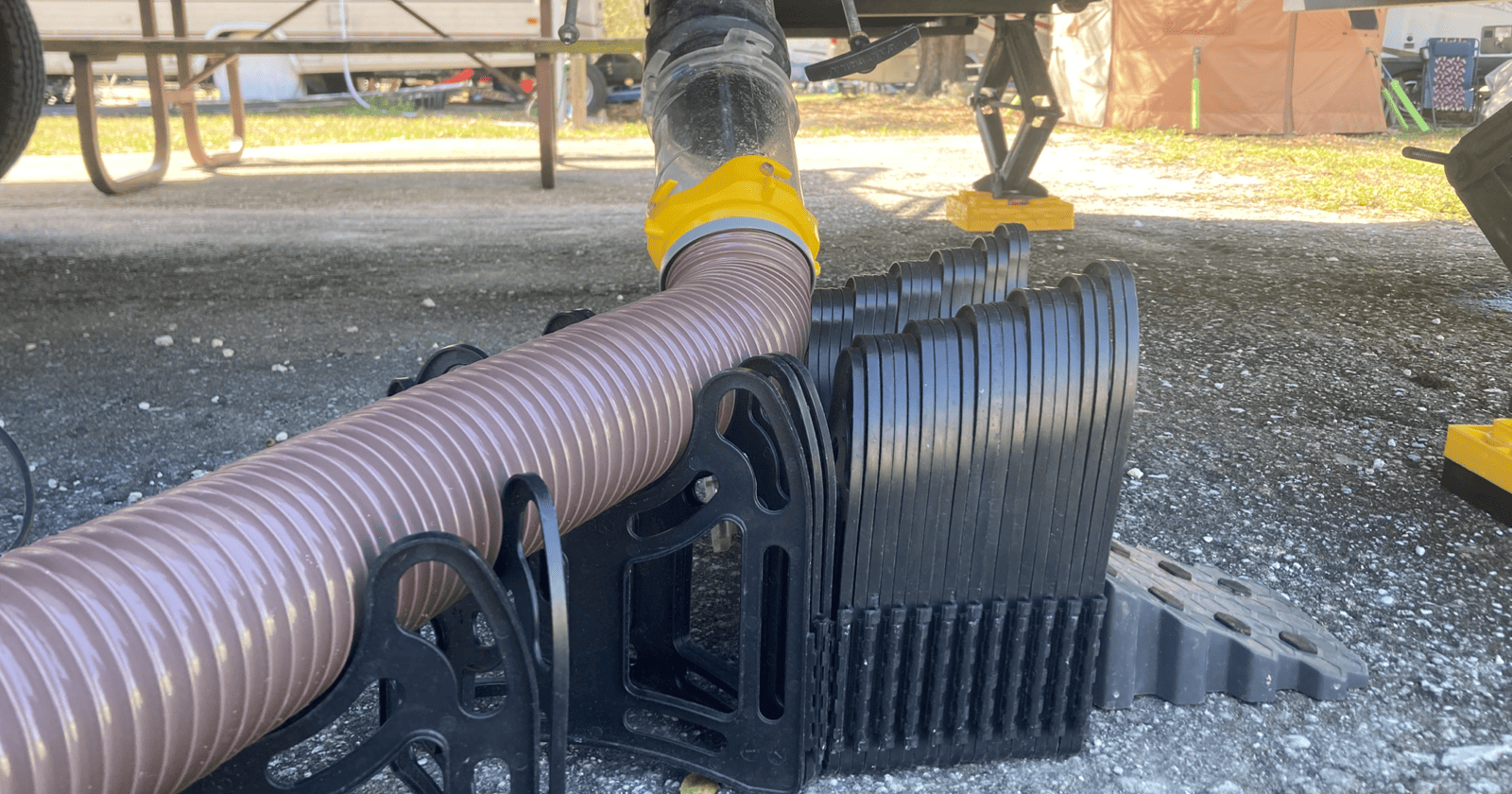In this article, you’ll learn the 16 most common mistakes people make while operating an RV and the simple solutions to steer clear of them.
#1 – Not Checking Your Tires Before Every Trip
Blowouts are the biggest cause of damage to campers. Old, unevenly worn or under inflated tires can cause accidents.
Avoid potential blowouts by inspecting your tires and tire pressure every time you take a trip. I carry a portable air compressor that gives me a quick reading on pressure and can inflate my tires on the spot when I see they are low.
Don’t skimp on tire quality, overload your camper, or drive fast on rough surfaces which all add to poor tire performance.
#2 – Not Knowing Your Campers Weight/Height
Another reason RV damage occurs is by not knowing your RVs weight and height. This mistake can create tire and axle damage, make your camper overturn on curves, or get stuck going under a bridge.
Avoid this issue when operating an RV by knowing the real height of your camper, including the height of the A/C! Find roads you can safely travel with your size RV by using a GPS app meant for RVers. Turn your phone into an RV Safe GPS with the RV LIFE App; no more worrying about steep mountain passes, low clearances, bridge weight limits, or propane-restricted tunnels.
I learned it is imperative to know the load capacity numbers for your particular RV. Pack up your camper as you would when taking a trip, drive to a truck stop and weigh your camper. If you are not within the weight parameters of your vehicle adjust your load accordingly.
#3 – Not Having the Proper Truck to Tow Your Trailer
A common mistake is taking a half-ton truck and thinking it will pull any camper. It may, but it won’t necessarily be safe. Pulling an overweight camper up a mountainside with a half-ton truck is dangerous.
The safe solution is to look at every number stated for tow capacity with the real weight of your fully-loaded camper. If you are anywhere near the max, upgrade to a one-ton or higher truck or downsize your camper.
#4 – Awning Dilemmas
I ripped my own awning during one gusty rainshower. I learned quickly that wind and rain could have bent my whole awning frame and not just torn the fabric.
Avoid this by taking in your awning every time you’ll be away from your camper for any length of time. I know this is a pain, especially with a manual awning, but it’s the only way to guarantee no damage will occur.
I have heard of awnings unrolling while traveling down the highway. I added a latch to mine, so this couldn’t happen to me if the locking mechanism failed. It is these extra precautions that give you peace of mind when operating an RV.
#5 – Not Providing Electrical Protection
Burning up your appliances can happen when you plug your camper into a faulty electrical box. It is a huge mistake to not own a surge protector made specifically for your 30 or 50 amp RV.
Surge guards protect against a very expensive replacement of your camper wiring and appliances. These units go between the power pedestal and your camper plug.
My tip is to upgrade to a model with indicator lights to show if pedestal wiring is safe or faulty. This unit has alerted me to bad wiring many times over the years and is worth every penny.
#6 – Forgetting to Winterize
It can freeze just about anywhere, so forgetting to winterize leads to burst pipes and damage.
Avoid this mistake by always blowing out pipes and adding anti-freeze to RV holding tanks where necessary every time you store your RV no matter what climate you are in.
#7 – Being in a Rush
You are towing or driving a large vehicle that is flimsy in manufacture. Even small impacts create expensive damage. Rushing to get anywhere leads to mistakes.
Solution? Slow it down and allow yourself time to react appropriately to your surroundings. Take the slow lane on highways, be cautious at gas stations and remember your swing out radius when making sharp turns. Go exceptionally slow moving into campground sites where there are many obstacles to avoid.
A bump is always better than a crash. Go slow.
#8 – Deciding to Skip the Last Walk Around
Don’t be that guy dragging his sewer hose down the highway. Eliminate embarrassment and damage by always walking around your camper one last time before pulling away.
Create a checklist for departure and refer to is as you do your final walk around. My list has saved me a lot of grief.
My pro tip is to never be talking with anyone when doing your final walk around, distractions cause mistakes.
#9 – Not Preparing an Emergency Tool Kit
If you think it’s a waste of precious space to carry a toolkit, you will learn the hard way what a mistake you made.
Solve this potential mishap by carrying an essential basics toolkit. The need for a quick fix will occur, and it will usually happen at night when you are 100 miles from nowhere. Be ready.
#10 – Ignoring Routine Maintenance
Most people neglect routine RV maintenance. This mistake causes leaks to grow into serious damage, paint to fade and chip, and an air conditioner that quits when you need it most.
The motion of travel causes all kinds of things to rattle loose. Inspect fittings and connections, seals around windows, roof, and slides. Wash off those bugs plastered to your camper.
A few minutes every week will keep small problems from becoming costly issues when operating an RV.
#11 – Not Knowing Your Sewage System
I have seen flooded campers often due to the mistake of not knowing how much an RV sewer tank holds or by having blind faith in the sensor monitor attached to them.
If sensors have gone out (a common RV issue) or you forget to empty a full tank, the water has to go somewhere, and that somewhere is back into your camper via the shower or sink drains.
Learn your tank capacity but if you are ever unsure if you need to empty the tank, be safe and dump.
#13 – Black Tank Back Ups
Some think it’s easier to keep their drain lines open when connected to a campsite sewer system. This is a big mistake because RV tanks are not meant to stay dry and critters can crawl through the open pipe and right into your RV.
Imagine dropping toilet paper and waste into a pile over and over again. The small amount of water flushed with it flows out the pipe, but the pile remains. And grows. At some point, the pile will either slide to the drain pipe and clog it or build up to your toilet flange and block it.
Here is a simple method to stop this messy, smelly problem. Keep your tanks closed until they are at least 3/4 full. Use safe chemical additives to break up waste and eliminate odors. Dump your black tank and follow with your grey tank.
I follow this and have never had a backup or clog.
#14 – Not Double Checking Hitch Connections
I have seen the damage caused by hitches not fully engaged in both pull-behinds and fifth wheels. It is rare you can escape such a mistake undamaged.
Avoid this by always double checking hitch connections before operating an RV.
In a pull-behind, lower your jack and see if the truck bed lifts. In a fifth wheel, pull ahead very slowly while activating the trailer brakes to see if you feel the trailer tug on the truck. These signs mean the hitch is engaged correctly and you are safe to go.
#15 – Not Investing in a Backup Camera
Some RVs come with a camera installed, but it’s a mistake not to purchase one if yours does not. An RV has many blind spots and sometimes you are alone trying to park or the person with you is on the wrong side of the trailer to see an obstacle in your path.
There are many easy to install, affordable cameras that will relieve the stress of wondering if you are going to hit anything behind you when backing up.
My camera has saved me (and my motorhome) more times then I care to mention.
#16 – Forgetting to Close Ceiling Vents and Windows
Ventilation is excellent but leaving your camper for even a short length of time with open vents or windows can cause more damage than its worth. A brief rain can leave your mattress soaked, or your wood flooring swelled.
Fix this by routinely closing all windows and vents before heading away. Another option is to install the large covers that go completely over your vents. They protect from rain yet allow you to keep your vent open for better airflow. I love mine.




